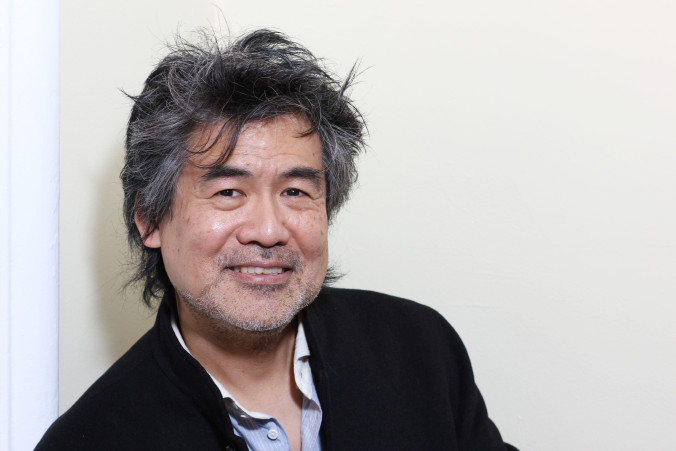
David Henry Hwang is a playwright, librettist, and screenwriter. Some of his works include M. Butterfly (Tony Award for Best Play, Pulitzer Prize nominee), FOB (OBIE award), Golden Child (Tony nomination for Best Play), Yellow Face (OBIE award, Pulitzer Prize nominee), Chinglish, and Kung Fu. He co-wrote the book for Disney’s AIDA, wrote the book for Disney’s Tarzan, and wrote a new version of the book for Rogers and Hammerstein’s Flower Drum Song (Tony nomination for Best Book). He has also written for film, television, and opera, and currently teaches playwriting at Columbia University.
You attended Stanford University, where you founded the Asian American Theater Project (AATP) and produced your first play in your dorm. What did you learn from your time at Stanford?
I think of that period as the time I became interested in theatre, found my voice, and wrote my first play which would be professionally produced. Which is pretty good for four years.
FOB premiered with AATP at Stanford before it was selected for the Eugene O’Neill Playwriting Conference and produced Off-Broadway at the Public Theater soon after. What was it like to experience this rapid success?
When FOB opened at the Public, I remember making the decision to return to California before the opening. If the notices were bad, I didn’t want to feel worthless; if they were good, I didn’t want to think I was a genius. Putting a literal distance between myself and critical success or failure was a good impulse. However, that’s much more difficult to do today in our digitally connected world. I also think early success is hard to properly appreciate because you don’t know anything else. Only after subsequent flops did I really understand how rare a gift I was given.
What inspires you?
I continue to be fascinated by the relationship between external events and our internal sense of self. This has often led to my writing about how individual identities are shaped by social and political forces. I don’t believe that character is inborn, but largely determined by one’s context. Therefore, when that context changes, our identities can transform into something very different. At the moment, I’m interested in how shifting demographics in this country are redefining the way we see ourselves as Americans, and also in the evolving U.S.-China relationship.
What kind of theatre excites you?
I like theatre that engages both the mind and the emotions. Within that mandate, I’m interested in all sorts of forms — from commercial Broadway jukebox musicals to the experimental and avant-garde. I feel that, as a playwright, I’m much more of a formalist than I’m usually perceived to be, i.e. I like to study diverse forms and apply them to my own work.
What advice do you have for playwrights starting out?
This is not particularly profound, but I believe true: do not worry about commercial or critical acceptance, write what moves you most deeply, what you need to explore. It’s impossible to predict what will or will not be “successful.” A truly successful play is one that enriches the author’s spirit. However, it is also the case that this sort of work is also likely to be the most successful from a career standpoint. Paradoxically, success shouldn’t be your goal. Career success is the icing on the cake, not the cake itself.
You have worked in theater, musical theater, television, film, and opera. Can you tell us more about writing across so many genres?
The main question is: who holds the primary creative vision? In each genre, there’s usually someone who holds that vision, and the other artists support him or her. With plays, that’s usually the playwright. In TV, the showrunner; in film, the director; in opera, the composer. Musical theatre is tricky because that usually needs to be a mind-meld between the book-writer, composer, lyricist, and nowadays, often the director and/or producer as well. It also accounts for why musicals are so difficult to create. Going into each of these genres, you have to know the role you’re playing and feel comfortable if you decide to embark on that journey.
You teach playwriting at Columbia University. What are some of the most important things you teach your students?
I believe, if one wants to have a long career, it’s important to diversity one’s creative portfolio. In other words, learn how to do a lot of things. In the Columbia MFA playwriting program, we offer screenwriting, TV writing, musical theatre courses, and will soon add teaching opportunities, because these are all ways playwrights can make a living. Over the course of a career, there will be times when you go cold in, say, movies, but then hopefully, you can get work in another genre. In order to continue writing our plays, we have to find ways to survive.
Most of your plays center around Asian-American identity and conflicts between the East and West. What are some ongoing challenges and achievements in the representation of Asian Americans in theatre today?
Interestingly, Asian American representation has advanced most dramatically over the past couple of years on television. Suddenly, we have a number of TV shows featuring Asian American lead FRESH OFF THE BOAT, DR. KEN, MASTER OF NONE, etc. The increase in Asian actors on TV (and film, to a lesser degree) is driven partially by the importance of China, which will soon surpass the U.S. as the world’s largest movie market. Hopefully, the success of these shows will encourage theatre producers to realize there’s a domestic audience for Asian American stories as well. Because there’s such a wealth right now of excellent young Asian American playwrights — Lloyd Suh, Jihae Park, A. Rey Pamatmat, Young Jean Lee, Hansol Jung, Susan Stanton, Qui Nguyen, the list goes on and on. So far, only Rajiv Joseph and I have made it to Broadway, but so many more of these writers deserve wider exposure.
What projects are you working on now?
I’m working on a rewrite of my Bruce Lee play, KUNG FU, as well as a new play that I can’t discuss yet, but which will premiere in 2017. In TV, I’m a writer/producer for Showtime’s THE AFFAIR and am developing a new series of my own. In opera, I’ve co-written the libretto for DREAM OF THE RED CHAMBER with composer Bright Sheng, which will premiere at San Francisco Opera this fall, and writing a couple of projects with composer Huang Ruo. I’m also developing a new musical, THE FORGOTTEN ARM, with singer/songwriter Aimee Mann.
What is something most people do not know about you?
I like to cook — mostly Asian, but other cuisines too.
What does the future look like for you?
Well, my vision of the future can’t help but be colored by having been stabbed in the neck four weeks ago by a random attacker, who severed one of my arteries. The fact that I’m completely recovered makes me feel simply grateful to be alive, lucky that I get to stay on this earth a bit longer and to make every day count since we never know when it’ll be our time to go.
What do you think about the current state and the future of theatre?
I think those of us who work in theatre are incredibly lucky to have chosen a form that cannot be digitized (at least for the moment). It seems to me that the centers of artistic culture right now are TV and live entertainment. Musicals, at least, are currently closer to pop culture than at any time since the 1950s. So that’s good. The problem is that Broadway pulls the cart and sets the agenda for our entire field, in a way that also hasn’t really been the case since the 1950s. So I think we need to regain a balance — where we place just as much, if not more, importance on work which is never intended to make money, as on pieces which hold the promise of commercial success.
